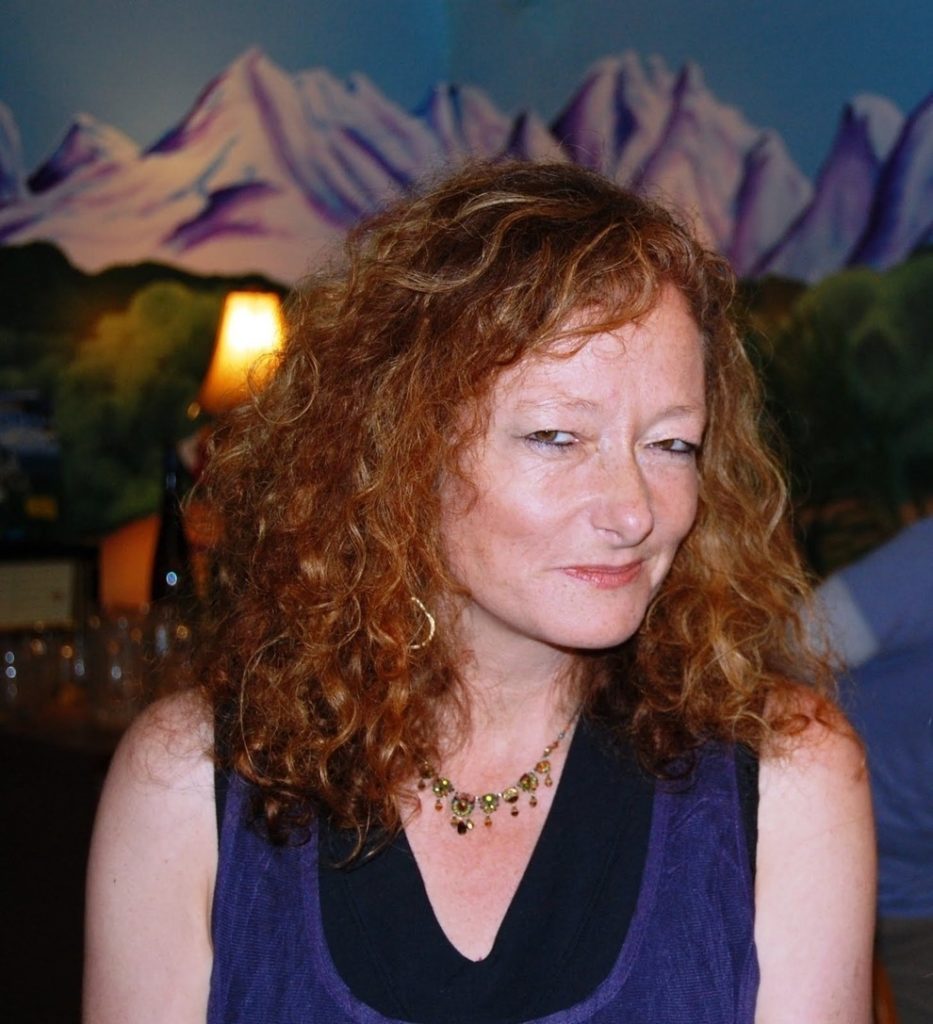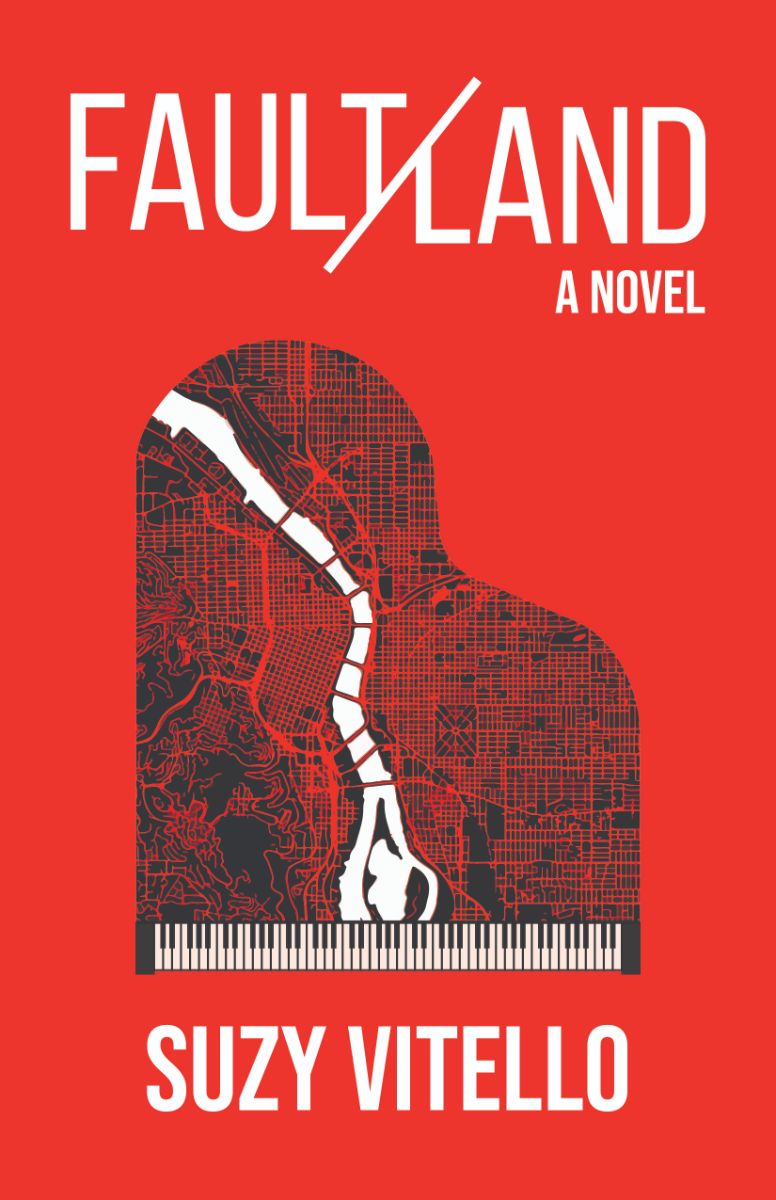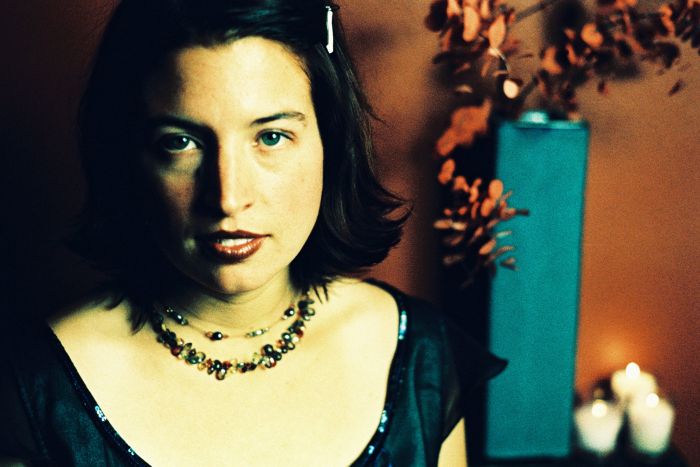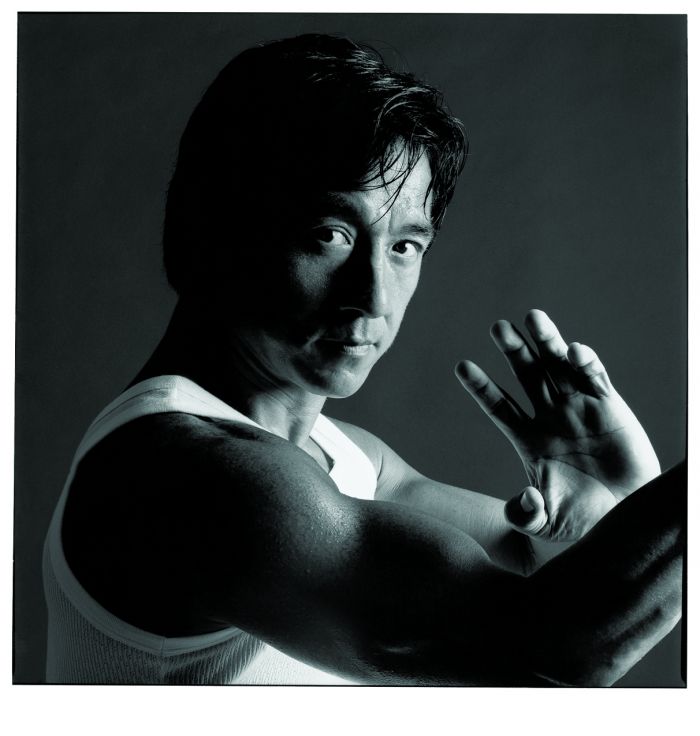Portland novelist Suzy Vitello imagines the “big one” and a family united by survival
Interview by Cathy Caroll
The “big one,” the earthquake which scientists predict could strike the Northwest at any moment, is what Suzy Vitello leverages in her new novel, Faultland, which follows three siblings working together to survive disaster in Portland. If resources don’t run out, if sickness doesn’t overtake them, if alt-right militias don’t converge and if the wet mass of land speeding toward their childhood home and makeshift shelter doesn’t bury them, they’ll have to navigate past traumas and the mistakes of their parents to survive as a family.
Literary figures praising the book include Portlander Lidia Yuknavitch, author of the nationally acclaimed and bestselling novel The Book of Joan. She said Faultland “is about our collective resilience and the loyalty that holds us all together in the end.” Oregonians will no doubt savor this distinctly Portland book from Vitello, a stalwart of the city’s literary community who runs writers’ workshops and has worked with authors such as Chuck Palahniuk and Cheryl Strayed. A devoted Timbers and Thorns fan, she lives in Portland, with her husband, their dog and occasionally one or more of their five kids.

What first inspired you to write Faultland?
I moved to Portland in September 1989, right before the Loma Prieta quake in the Bay Area. Social service agencies in Portland mobilized with donations of blankets and coats and money for the victims, and shortly after that there was widespread speculation about Portland’s readiness for a similar seismic event. Lots of, ‘What if we had an earthquake of that magnitude here?’
Then, there was the early morning spring break quake in 1993. I lived in an old wood-frame house, and the shaking was horrific. I was a single mom of two young kids, and I’ll never forget running into their bedrooms screaming, panicking to get us all outside. That quake was a 5.6 and the epicenter was well south of Portland, so from that time forward I became obsessed with the possibility of the ‘big one’ shifting the ground beneath a city largely built on liquefiable soil.
Who was your favorite character in the novel and why?
I love this question! And when I ponder it, I have to say that I consider my three point-of-view characters, who happen to be siblings, as my work children. You’ve heard the expression work wife? It’s like that. Can’t really pick a favorite, per se, but I do love them differently. Early drafts set Morgan up to be the main character, but somewhere along the line one of the developmental editors at Ooligan (Press) pointed out that Olivia was the character experiencing the most profound change, and perhaps I should home in on her a bit more. Olivia was the most fun to write, I’ll admit. At the start of the book, she’s mouthy and entitled and brash. I think writing into her outrages was great sport, and possibly a bit passive aggressive on my part—as it invited me to hammer out my resentments of the ‘Karen’ type personality. The sanctimonious, self-absorbed white woman who goes through life filtering all events through a lens of self-centered privilege.
What is your writing process like?
I’m a binge writer. Because my bread-and-butter job is as a freelance book coach and editor, I’m usually too deeply involved with my clients’ work to maintain an every-day relationship with my own pages. That said, when a story grabs me, I have to see it through, and will schedule time to get it out in, what I call, zero draft form before setting it aside for months in order to reenter in more of an editor mode. Ask my poor husband! Once I’m hooked I bury myself in my tiny office hours each day, and I’m horrible to be around.
Did you have a character who was harder to write than others?
I had a hard time hearing Sherman’s voice. He was challenging to write because he’s the furthest from my frame of reference. I had to really dig into his childhood in order to flesh him out. He’s a composite of the dude-bro-stoner. A Portland cliché, I suppose. But he was emotionally abused by his father, and conflicted about his mother whom he tried, unsuccessfully, to protect from his dad’s rages. In order to fully develop Sherman, I had to reach a point of empathy for him.
How did writing such an emotionally-charged book impact you?
Did you feel exhausted by it or did it inspire you either personally or professionally?
For me, writing into my fear is liberating. Giving voice to the monster is curative. With Faultland, redemption for a fractured family was the carrot that kept me on the dark trail. I needed to see these three siblings grow into grace and heal their divides. On a more political scale, I’ve always been a believer in justice. In good angels winning out over evil. All the stuff of fairy tales. But, I’m also a believer in thermodynamic law. The natural tendency toward chaos. Entropy. I’m interested in how disruption precedes progress. Is, in fact, necessary for it to happen. So yeah. Exhaustion. But tempered with hope.
You’re well known for being a writing instructor and a part of the Portland literary community. Do you have any advice for aspiring writers?
Dear fledgling writer, your voice is not only valid, but necessary. Nobody else has lived your experience. No one has your particular take on the events you’ve witnessed. Resist pandering to the expected. The normative. Be brave on the page. Follow your curiosity and know that practice and tenacity are more the ingredients for success than is innate talent. Oh, and read like it’s your job.
Was it difficult to imagine Portland decades into the future? Were there any specific things you were especially excited to explore about a future world?
I’ve lived in Portland for three decades, and some things are exactly as they were when I arrived. The town-trying-to-be-a-city, for instance. The stubborn independence of our inhabitants. Portland is an enclave of creativity. Of experiment. There is this passionate “getting back on the horse and trying again” energy when we fail. Scrappy tenacity. Looking ten years into the future, I just took those qualities and built them out. We keep falling into relevance. This past summer we were the focal point of the national news. The protests, the riots, the unrest. Coming to terms with the systemic racism baked into our city. Looking at the culture of law enforcement and how it has failed to serve and protect in a way that earns the trust of the population. The Proud Boys and other extremist groups leveraging that mistrust to foment violence. I wanted to take those issues to a pressure point (metaphor this way), throw in some sexy new tech (face wands, crypto cuffs), add an unprecedented catastrophe, and filter the whole mess through the points of view of a modern, dysfunctional family.
What kinds of research did you do to make such a realistic disaster story? Was there anything that surprised you in your research?
After doing the typical Google deep dive, I interviewed Lisa Corbly, the Division Chief of Multnomah County’s Office of Emergency Management, who offered some interesting logistical information about the county’s response in the event of catastrophe. I also attended several earthquake preparedness community events.
Up until last year, I’d planned for the earthquake in Faultland to be the Cascadia Subduction Zone quake—the so-called ‘Big One’ that’s been largely the centerpiece of articles centered on the Pacific Northwest’s seismic vulnerability. But I eventually realized that I wanted the focus to be more local, more Portland-based, so I switched the epicenter and type of quake to originate from the Portland Hills Fault instead. A much more rare and unlikely earthquake, the Portland Hills quake would be more devastating to the city, possibly destroying one in three buildings in the Portland metro region, and displacing as many as 257,000 people and injuring or killing up to 63,000.
You’re a Portland local. If you could save only one Portland landmark from the “Big One” what would you save?
Oh boy! Well, we’re young here, as far as Western civilization goes. We don’t have, say, Etruscan villages that date back to the twelfth century or anything. I’d have to say that I might save the Pittock Mansion — as bougie as that sounds. As you might guess, I’m fascinated by families and power dynamics. Socio-economic clashes, political strongholds, and the houses that Portland’s founders built (mostly on the backs of the poor). There are so many stories about the lives of the people who lived in the Pittock Mansion. It’s the closest thing Portland has to Downton Abbey with its grand, marble staircase, music room, various sleeping porches and even a Turkish smoking room. Then there’s the impeccable grounds that overlook the city and the Cascades. It seems like so much of the history of Portland is connected to that structure, including the origin of our city’s main newspaper, The Oregonian. Also, I understand the Pittock Mansion (like all proper mansions) is haunted!
What do you think is the most important message of the novel?
In a word: resilience.
What’s next for you after Faultland?
Sticking with speculative fiction, I’m drafting a novel that takes place thirty or so years in the future, also set in the Pacific Northwest. It centers on a loosely affiliated group of people who become targets of an embryo trafficking cartel at a time when infertility has become the norm. You know, just another uplifting romp!










Thanks for this! Faultland is available at your local bookstore as well as Amazon, March 30th!